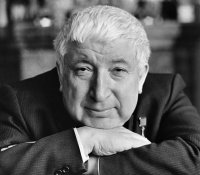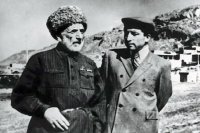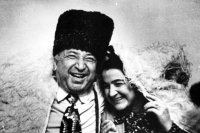 September 8 marks the 100th anniversary of the birth of the people's poet of Dagestan, prose writer, translator, and public figure Rasul Gamzatovich Gamzatov. His works are loved by many generations of readers, and the famous lines of poetry: “Sometimes it seems to me that the soldiers who did not return from the bloody fields did not once die in our land, but turned into white cranes,” became an ode to soldiers all over the world.
September 8 marks the 100th anniversary of the birth of the people's poet of Dagestan, prose writer, translator, and public figure Rasul Gamzatovich Gamzatov. His works are loved by many generations of readers, and the famous lines of poetry: “Sometimes it seems to me that the soldiers who did not return from the bloody fields did not once die in our land, but turned into white cranes,” became an ode to soldiers all over the world.Rasul Gamzatovich was born in the small village of Tsada in mountainous Dagestan and inherited the talent of his father, the national poet of Dagestan Gamzat Tsadasa. The father told his son stories, fairy tales, read his poems, and encouraged the imagination of the boy's lively mind. Rasul published his first poems when he was a schoolboy, and used his father’s name as a surname - Rasul Gamzatov.
After graduating from school, Rasul received a pedagogical education and worked as a school teacher, radio editor and correspondent for the Avar newspaper Bolshevik Gor. In 1943, his first book was published in the Avar language. In his beautiful native language, he wrote about the mountains, about love and, of course, about the war in which his two older brothers died.
After the war in 1945, Rasul Gamzatov entered the Moscow Literary Institute named after M. Gorky and in 1948 publishe
 d his first book in Russian called “Songs of the Mountains.”
d his first book in Russian called “Songs of the Mountains.”After graduating from the institute, he translated Russian and Soviet classics into the Avar language, traveling around the world from Cuba to Mongolia. Over the course of his life, Rasul Gamzatov published about a hundred books.
It is worth noting that Rasul Gamzatovich wrote poetry in his native Avar language, which has no rhymes. All poems in Avar are songs. They are easy to sing. Historically, writing in the Avar language appeared only during the years of Soviet power, after 1917. The name of Rasul Gamzatov became known to the Russian-speaking public thanks to the poet’s brilliant translators and friends, with whom he studied at the same institute - Naum Grebnev and Yakov Kozlovsky. It was they who were able to convey to readers the flavor of Dagestan poetry.
Rasul Gamzatov had a
 wife named Patimat, with whom he lived for more than 50 years and dedicated many of his poems. She died in 2000. Survived by three daughters and four granddaughters. His younger brother Gadzhi Gamzatov lives in Makhachkala, who became an academician of the Russian Academy of Sciences. Rasul Gamzatov himself died on November 3, 2003 and was buried in Makhachkala in a cemetery at the foot of Mount Tarki-Tau, next to the grave of his wife Patimat.
wife named Patimat, with whom he lived for more than 50 years and dedicated many of his poems. She died in 2000. Survived by three daughters and four granddaughters. His younger brother Gadzhi Gamzatov lives in Makhachkala, who became an academician of the Russian Academy of Sciences. Rasul Gamzatov himself died on November 3, 2003 and was buried in Makhachkala in a cemetery at the foot of Mount Tarki-Tau, next to the grave of his wife Patimat.Rasul Gamzatov is the pride of not only the Dagestan people, but also the entire Caucasus and all of Russia. A bright personality, a symbol of the era, a favorite of millions.
Reading his poems you are amazed at their wisdom and beauty.


